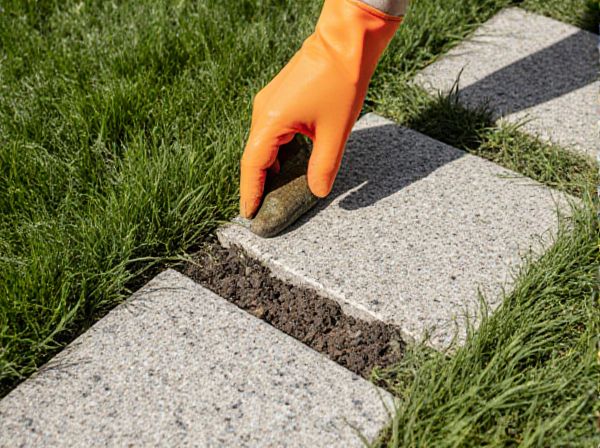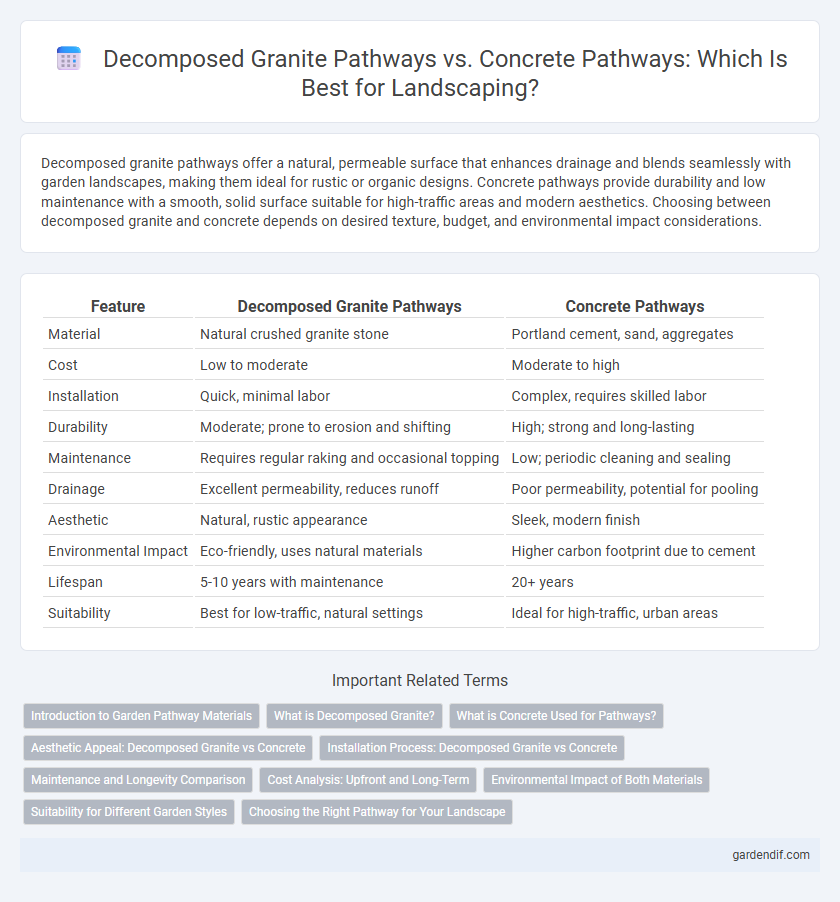
Decomposed Granite Pathways vs Concrete Pathways Illustration
Decomposed granite pathways offer a natural, permeable surface that enhances drainage and blends seamlessly with garden landscapes, making them ideal for rustic or organic designs. Concrete pathways provide durability and low maintenance with a smooth, solid surface suitable for high-traffic areas and modern aesthetics. Choosing between decomposed granite and concrete depends on desired texture, budget, and environmental impact considerations.
Table of Comparison
| Feature | Decomposed Granite Pathways | Concrete Pathways |
|---|---|---|
| Material | Natural crushed granite stone | Portland cement, sand, aggregates |
| Cost | Low to moderate | Moderate to high |
| Installation | Quick, minimal labor | Complex, requires skilled labor |
| Durability | Moderate; prone to erosion and shifting | High; strong and long-lasting |
| Maintenance | Requires regular raking and occasional topping | Low; periodic cleaning and sealing |
| Drainage | Excellent permeability, reduces runoff | Poor permeability, potential for pooling |
| Aesthetic | Natural, rustic appearance | Sleek, modern finish |
| Environmental Impact | Eco-friendly, uses natural materials | Higher carbon footprint due to cement |
| Lifespan | 5-10 years with maintenance | 20+ years |
| Suitability | Best for low-traffic, natural settings | Ideal for high-traffic, urban areas |
Introduction to Garden Pathway Materials
Decomposed granite pathways offer a natural, permeable surface that enhances garden aesthetics while promoting water drainage and soil health. Concrete pathways provide durability and low maintenance, ideal for high-traffic garden areas requiring structured, long-lasting surfaces. Choosing between decomposed granite and concrete depends on factors like budget, garden style, and desired functionality.
What is Decomposed Granite?
Decomposed granite is a natural, weathered granite material that breaks down into small, coarse granules ideal for creating permeable, stable pathways. It offers excellent drainage and a rustic aesthetic, blending seamlessly with natural landscapes compared to the solid, impermeable surface of concrete pathways. Often used in garden paths and walking trails, decomposed granite requires less maintenance and provides a more environmentally friendly option than concrete.
What is Concrete Used for Pathways?
Concrete is used for pathways due to its durability, low maintenance, and versatility in design, making it ideal for high-traffic areas and long-lasting surfaces. It provides a smooth, stable walking area that can withstand various weather conditions and heavy foot traffic without significant wear. Concrete pathways are commonly employed in residential gardens, public parks, and commercial landscapes for their structural strength and customizable finishes.
Aesthetic Appeal: Decomposed Granite vs Concrete
Decomposed granite pathways offer a natural, rustic aesthetic that seamlessly blends with garden landscapes, providing warm earth tones and a textured surface that complements greenery. Concrete pathways present a sleek, modern appearance, often customizable with various finishes and colors to suit contemporary designs but may appear more industrial and less organic. The choice between decomposed granite and concrete significantly impacts the overall visual harmony and style of outdoor spaces.
Installation Process: Decomposed Granite vs Concrete
Decomposed granite pathways offer a quicker and more cost-effective installation process, requiring minimal ground preparation and easy compacting with a roller or tamper. Concrete pathways demand extensive site excavation, form setting, reinforcing with steel rebar, and curing time that can span several days to achieve full strength. The choice between decomposed granite and concrete significantly impacts project timelines and labor intensity, with decomposed granite favored for DIY projects and concrete preferred for long-lasting durability.
Maintenance and Longevity Comparison
Decomposed granite pathways require regular replenishing and occasional compaction to maintain stability, showing moderate durability with a lifespan of about 10-15 years under proper care. Concrete pathways offer superior longevity, often exceeding 30 years with minimal maintenance such as occasional sealing and crack repairs. The choice hinges on balancing the natural aesthetic and moderate upkeep of decomposed granite against the enduring, low-maintenance nature of concrete.
Cost Analysis: Upfront and Long-Term
Decomposed granite pathways typically cost between $3 to $5 per square foot upfront, offering a budget-friendly alternative to concrete pathways, which range from $6 to $10 per square foot. Long-term maintenance for decomposed granite involves periodic replenishing and weed control, potentially adding to cumulative costs, whereas concrete requires minimal upkeep but may incur expensive repairs due to cracking. Evaluating total cost of ownership, decomposed granite is ideal for cost-sensitive projects, while concrete provides durability and lower maintenance expenses over time.
Environmental Impact of Both Materials
Decomposed granite pathways offer a more environmentally friendly option due to their permeability, which reduces stormwater runoff and promotes groundwater recharge. Concrete pathways, while durable, contribute to increased surface runoff and urban heat island effects because of their impervious nature and higher carbon footprint during production. Choosing decomposed granite helps minimize soil erosion and supports sustainable landscaping practices by allowing natural water infiltration.
Suitability for Different Garden Styles
Decomposed granite pathways offer a natural, rustic aesthetic ideal for cottage, xeriscape, and Mediterranean garden styles, blending seamlessly with organic landscapes and drought-tolerant plants. Concrete pathways suit modern, formal, or minimalist gardens due to their clean lines, durability, and versatility in shapes and finishes such as stamped or exposed aggregate. Choosing between decomposed granite and concrete depends on garden style, maintenance preferences, and desired texture integration.
Choosing the Right Pathway for Your Landscape
Decomposed granite pathways offer a natural, permeable surface that enhances drainage and blends seamlessly with garden settings, making them ideal for sustainable landscapes. Concrete pathways provide durability and low maintenance, supporting heavy foot traffic and modern design aesthetics with customizable finishes. Selecting the right pathway depends on balancing budget, environmental impact, and the desired look and function within your outdoor space.
Decomposed Granite Pathways vs Concrete Pathways Infographic

 gardendif.com
gardendif.com